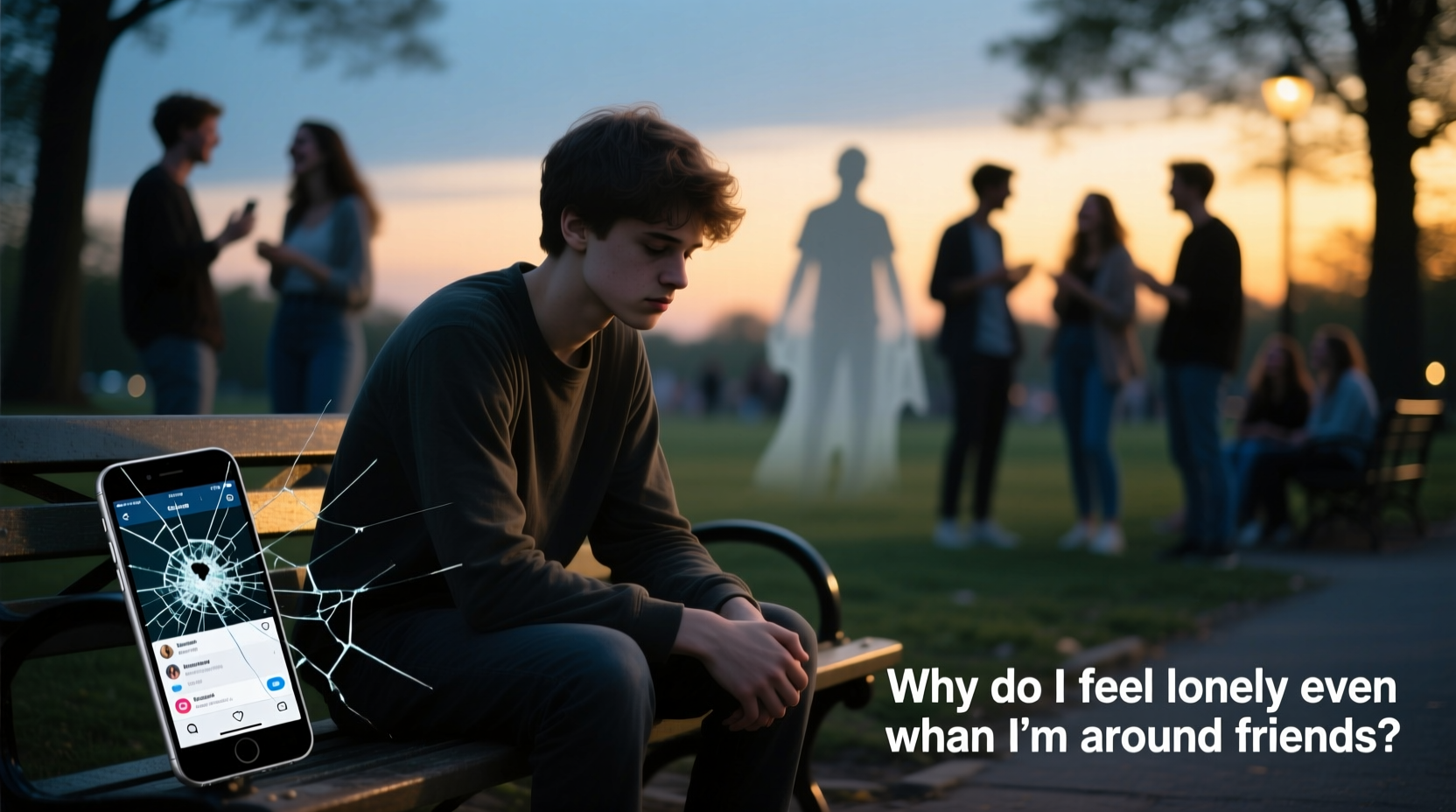Loneliness is not always about physical solitude. Many people sit in crowded rooms, laugh at shared jokes, and scroll through group chats—yet still carry a quiet ache of isolation. This paradox—feeling profoundly alone despite being surrounded by others—is more common than most realize. It reflects a deeper truth: loneliness is less about presence and more about connection. Emotional disconnection, mismatched expectations, or unmet psychological needs can leave you feeling invisible, even in the company of close friends. Understanding this phenomenon is the first step toward healing.
The Paradox of Social Loneliness

Loneliness is often misunderstood as a lack of people. In reality, it's a lack of meaningful connection. You might attend weekly gatherings, go out for drinks, or live with roommates, yet still feel emotionally distant. Psychologists refer to this as \"social loneliness\" or \"relational emptiness\"—a state where interaction exists, but intimacy does not.
This kind of loneliness stems from a gap between the relationships you have and the ones you desire. It’s not about quantity; it’s about quality. A conversation filled with small talk may keep silence at bay, but it doesn’t satisfy the human need for vulnerability, understanding, and mutual recognition.
“Loneliness is not the absence of company, but the inability to share what seems important with someone else.” — Rainer Maria Rilke, poet and philosopher
Why Emotional Disconnection Happens Among Friends
Even long-standing friendships can fall into patterns that foster surface-level interactions. Over time, routines replace depth. People assume they already know each other, so they stop asking real questions. Below are several key reasons why you might feel isolated despite having friends:
- Fear of vulnerability: Many avoid sharing true feelings due to fear of judgment, rejection, or burdening others.
- Different life stages: Friends may be focused on careers, relationships, or parenting, creating emotional distance if your paths diverge.
- Social performance: Some maintain a “happy” persona to fit in, hiding inner struggles behind humor or distraction.
- Lack of reciprocity: One-sided relationships—where you listen but aren’t heard—can breed resentment and loneliness.
- Unresolved past conflicts: Lingering misunderstandings or unspoken tensions can create emotional barriers.
These dynamics don’t mean your friendships are failures. They reflect the complexity of human connection and the effort required to sustain it over time.
Recognizing the Signs of Hidden Isolation
Social isolation isn’t always obvious. It can manifest subtly, woven into daily habits and thought patterns. Being aware of these signs helps you identify emotional disconnection before it deepens:
- You frequently feel drained after social events, even enjoyable ones.
- You rehearse conversations in your head but rarely say what you truly feel.
- You compare your inner world to others’ highlight reels and feel inadequate.
- You stay in touch regularly but haven’t shared a personal struggle in months.
- You feel like an observer in your own life, going through motions without genuine engagement.
If several of these resonate, you may be experiencing emotional loneliness—a signal that your relational needs are not being met, regardless of your social activity level.
Case Study: Maya’s Experience
Maya, 29, had a wide circle of friends from college and work. She attended birthday parties, joined group trips, and was active on social media. Outwardly, she seemed socially fulfilled. Internally, she felt increasingly disconnected. Conversations revolved around surface topics—jobs, travel, dating—but never touched on her anxiety about career direction or grief over her father’s recent passing.
She noticed that whenever she tried to open up, the topic quickly shifted. Others would offer quick advice or change the subject. Over time, she stopped trying. She began declining invitations, not because she didn’t want to see people, but because being around them made her feel more alone.
It wasn’t until she confided in a therapist that she realized: her loneliness wasn’t about lacking friends—it was about lacking mutual understanding. With support, she began setting gentle boundaries, initiating deeper talks with one trusted friend, and eventually found a small group where authenticity was welcomed.
Maya’s story illustrates a crucial point: loneliness in company often points not to personal failure, but to a mismatch between emotional availability and relational context.
Building Authentic Connection: A Step-by-Step Approach
Rebuilding meaningful connection requires intention. It’s not enough to simply spend time together—you must create space for emotional honesty. The following steps can help bridge the gap between presence and intimacy:
- Reflect on your needs: Ask yourself: What kind of connection am I missing? Do I need to be heard, understood, supported, or affirmed?
- Identify safe spaces: Not every friendship is equipped for deep dialogue. Consider which relationships have shown potential for vulnerability.
- Initiate gently: Share a small personal thought or feeling first. For example: “I’ve been thinking a lot about purpose lately—have you ever felt unsure about your path?”
- Practice active listening: When others open up, respond with empathy, not solutions. Say things like, “That sounds really hard,” instead of jumping to fix it.
- Be patient: Trust builds slowly. One honest conversation doesn’t transform a relationship overnight.
Authenticity is contagious. When you model openness, you give others permission to do the same. Over time, this can shift the tone of entire friend groups.
Checklist: Strengthening Emotional Connection
- ✅ Schedule one-on-one time with a friend for undistracted conversation
- ✅ Share something personal this week—even if it feels uncomfortable
- ✅ Notice when you’re performing vs. being authentic in social settings
- ✅ Reflect on which relationships leave you energized vs. drained
- ✅ Write down three qualities you value in deep friendship (e.g., trust, patience, curiosity)
Do’s and Don’ts of Navigating Social Loneliness
| Do | Don’t |
|---|---|
| Initiate conversations about feelings and experiences | Assume others know how you feel without telling them |
| Validate others’ emotions without rushing to solve | Dismiss loneliness as “just being dramatic” |
| Set boundaries with draining relationships | Stay in relationships solely out of habit or guilt |
| Seek professional support if loneliness persists | Isolate completely to avoid discomfort |
| Join communities centered on shared values or interests | Rely only on social media for connection |
Expert Insight: The Psychology of Belonging
Dr. Elena Torres, a clinical psychologist specializing in interpersonal relationships, explains: “Humans have a fundamental need to belong—to feel seen, valued, and connected. But modern social environments often prioritize convenience over depth. We confuse connectivity with closeness.”
“The most painful form of loneliness is feeling emotionally invisible to people who know your name.” — Dr. Elena Torres, Ph.D., Interpersonal Psychology Research Lab
She emphasizes that rebuilding connection starts with self-awareness: “You can’t expect others to meet needs you haven’t identified yourself. Start by asking: ‘What makes me feel truly known?’ Then look for opportunities—within existing friendships or new communities—to express that.”
FAQ: Common Questions About Social Loneliness
Can you be lonely in a relationship or among friends?
Yes. Loneliness is defined by emotional disconnect, not physical solitude. It’s entirely possible to feel lonely in a marriage, family setting, or friend group if there’s a lack of emotional safety, reciprocity, or depth.
Is feeling lonely a sign of depression?
Not always, but chronic loneliness is a risk factor for depression. If loneliness is persistent, accompanied by low energy, hopelessness, or loss of interest in activities, it may indicate a need for mental health support.
How do I tell a friend I feel disconnected without hurting them?
Use “I” statements to express your experience without blame. For example: “I’ve been feeling a bit distant lately, and I miss deeper talks. Would you be open to catching up properly sometime?” This focuses on your needs rather than their shortcomings.
Conclusion: Reclaiming Connection in a Connected World
Feeling lonely among friends is not a personal flaw—it’s a signal. It tells you that your emotional needs are calling for attention. In a world that equates busyness with belonging, true connection requires courage: the courage to be vulnerable, to ask for more, and to let go of relationships that no longer serve you.
Start small. Choose one person you trust. Share something real. Listen with presence. Notice how it feels to be seen—or to offer that gift to someone else. Meaningful connection isn’t built in grand gestures, but in consistent, honest moments.









 浙公网安备
33010002000092号
浙公网安备
33010002000092号 浙B2-20120091-4
浙B2-20120091-4
Comments
No comments yet. Why don't you start the discussion?